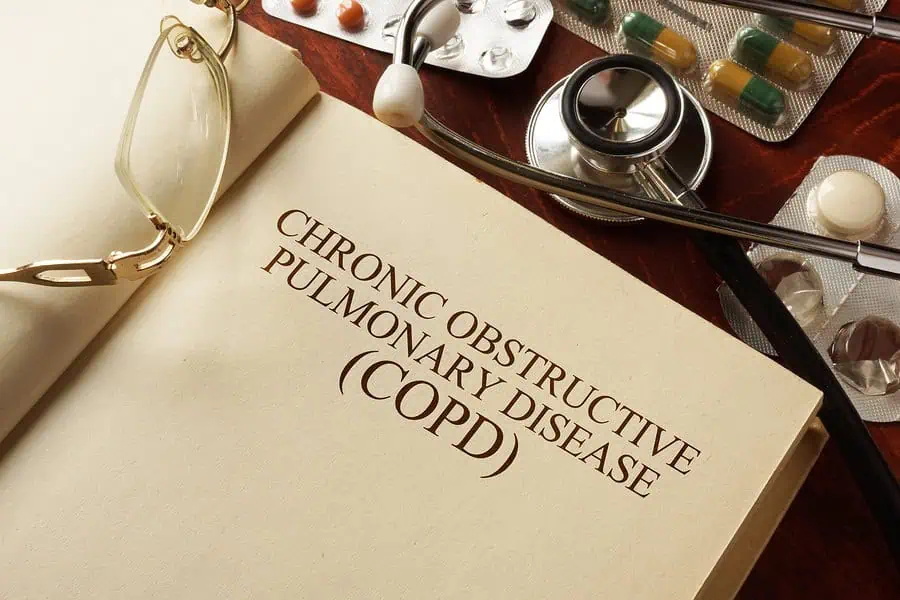What Is COPD?
Chronic obstructive pulmonary disease, also referred to as COPD, is a progressive and chronic inflammatory disease that causes deterioration of the lungs. Emphysema and chronic bronchitis also fall under the umbrella of COPD.

COPD is generally caused by exposure to irritants, most commonly cigarette smoke or harmful gasses. In rare cases, some people may have a genetic variant (alpha-1-antitrypsin or AAT deficiency) that can result in a diagnosis of COPD. Adults with asthma are also as much as 12 times more likely to develop COPD than those who do not have the condition.
Symptoms of COPD often include gasping, wheezing, shortness of breath, and coughing. Treatment for COPD includes oxygen therapy, pulmonary rehabilitation, and medications like steroid inhalers.
How Does COPD Cause Disability?
COPD is generally considered treatable if caught early enough, and patients can turn to medications and lifestyle changes such as quitting smoking and avoiding irritants to manage their symptoms. However, in more advanced stages of the disease, patients may incur irreversible and severe lung damage that makes it difficult to breathe and exert one’s self. When one’s lung function is low and progressively deteriorating, it can make it impossible to work or carry out tasks of everyday living. If a person’s COPD is severe enough, he or she may ultimately be deemed unable to work and eligible for long-term disability benefits.
Evidence to Support Disability for COPD
To be eligible for long-term disability benefits, you must provide proof of your condition. This can be done through a lung function test, such as a spirometry test, conducted by a specialist. This test measures your FEV1 value, which represents the volume of air you can exhale in one second. A significantly reduced FEV1 indicates severe airflow limitations.
Alternatively, if you do not have a problem with air flowing in or out of your lungs (in other words, your FEV1 value is too high), but your lungs still have a problem oxygenating your blood, you may qualify for benefits with a poor DLCO (diffusing capacity of the lung for carbon monoxide) score or ABG (arterial blood gas values of oxygen and carbon dioxide) test score. A sample low DLCO score is one that is less than 10.5 ml/min/mm Hg or less than 40% of the predicted normal value for your race. Or, your ABG test values may be low (at rest or exercising).
Limited Work Capability Due to COPD
If your COPD has significantly impacted your breathing capacity to the point where you’re unable to maintain regular employment, you might be eligible for long-term disability benefits. To demonstrate the severe impact of COPD on your work capability, it’s crucial to obtain a medical opinion from your doctor detailing specific activities you can perform and those you should avoid — for instance, restrictions like lifting no more than 10 pounds, walking for no longer than 30 minutes consecutively, or avoiding environments with dust or fumes.
The insurance company will provide you with an Attending Physician’s Statement (APS). This statement classifies the kind of work you’re capable of (e.g., sedentary, light, medium, or heavy) based on your respiratory test outcomes and the medical limitations set by your doctor. You can also obtain a custom Residual Functional Capacity (RFC) form from a disability attorney.
Having Multiple Medical Problems
The vast majority of patients with COPD have other serious medical problems as well. For example, many people with COPD suffer from coronary artery disease, high blood pressure, diabetes, and obesity, as well as suffering from mental issues such as depression. When you have multiple medical conditions that limit your ability to work, you have a better chance of qualifying for benefits.
Consult with a Skilled Long-Term Disability Insurance Lawyer
An experienced long-term disability insurance lawyer can increase the likelihood that you will receive benefits due to COPD. Most long-term disability lawyers work on a contingency basis, meaning they only get compensated when you do. This ensures you can pursue your case without the added stress of immediate legal fees. Should you wish to discuss your disability claim, reach out to the Ortiz Law Firm at (888) 321-8131 to arrange a free case evaluation. We will assess your claim, advise on your eligibility for long-term disability benefits, and guide you on the next steps in the process.

